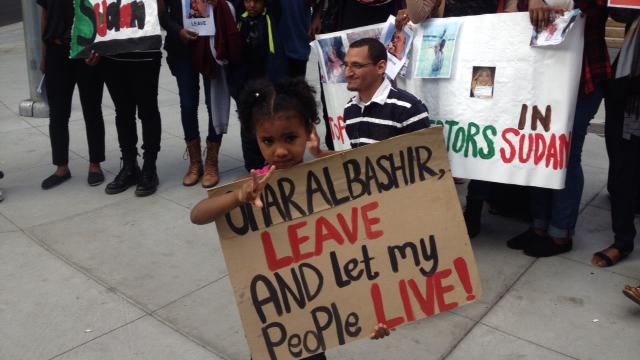Online videos showed violent clashes in Sudan one street over from my parents’ house
A rally for Sudan held in San Francisco.
Thousands of Sudanese expats in the US are spending their days and nights online these days – getting little sleep, calling home multiple times a day, checking on the safety of their family and friends – hoping for good news.
Including me.
And the news is disturbing.
After the government of Omar al-Bashir announced the lifting of fuel subsidies recently (making the price of a gallon of gas skyrocket from 12 to 21 Sudanese pounds, and causing the price of a canister of cooking gas to nearly double), people in the Sudanese cities of Medani and Omdurman ignited a chain of protests that eventually spread to the capital city Khartoum and Khartoum Bahry to the north.
For many, this was a last straw. They had already been suffering under crippling economic conditions. And, when the frustrated masses headed to the streets in protest, burning tires and stoning storefronts, authorities responded with tear gas, batons, and most unexpectedly, live ammunition.
Reports of the deaths immediately hit the Internet, for a time. Widely-distributed videos and photos showed bodies strewn with blood, of men, women, and children. The government shut the Internet down a number of times.
For many of us in the Sudanese diaspora living in the US, it has hit home in a profound way, with family members and friends among the dead. People have been recognizing their street corners and neighborhoods in the photos.
I cringed as I saw videos of violent clashes one street over from my parents’ home. Dozens of the clashes occurred within a quarter mile of my grandmother’s house. My father’s family lives in Burri, Khartoum, where some of the biggest protests and worst killings have happened, including the death of a young man who is now an icon of the movement, pharmacist Salah Sanhoury. (He also had family in San Francisco and Washington, DC).
I find myself obsessed with calling home every day. My Burri aunts tell me their sons were chased and beaten by security forces; shops were closed, except for a few hours in the early morning when they could get their bread and fava beans.
My cousins tell me on Facebook that one of them was beaten for just being outside at the wrong time. They say camouflaged security forces ride in pickup trucks randomly beating young men they find on the street.
My husband’s family is in Khartoum North, where neighborhoods witnessed huge street protests. There, people stayed indoors to avoid the chaotic and unpredictable streets.
Friends and other US-based Sudanese are chiming in on discussion boards and venting in comments on photos of the deceased (often referring to them as “martyrs”).
Every day, I hear of fellow journalists on the ground being arrested by security forces as the government closes media outlets and newspapers. Creative bloggers have found ways around the media blockage and the disrupted Internet, and have made contact with US and Europe-based bloggers who publish their live tweets, like the new Sudan Speaks. That’s how we heard reports of the arrest of journalist and blogger Daliah Elroubi, showing a picture of her husband and three kids waiting in vain for her release outside security headquarters. The government itself wasn’t ashamed to announce it had arrested 700 people in that single week.
It was all too much to bear.
And so Sudanese took to the streets and squares in the United States. As the photos poured in online of the now more than 50 people killed in the last seven days (UPDATE: the number of protesters killed is now believed to be upwards of 200), Sudanese who live in the US organized rallies and protests from San Francisco and Dallas/Fort Worth to Iowa City and Washington, DC.
On a recent Saturday, more than 100 people rallied outside the Sudanese Embassy on Massachusetts Avenue in Washington, DC, chanting “down down with al-Bashir” – referring to Sudan’s president of 24 years, Omar al-Bashir. They called on the Sudanese government to “stop killing protesters” and return fuel prices to what they were. They ended the rally with a moment of silence and prayer for the fallen.
Here in San Francisco, Sudanese gathered at Union Square in the heart of the financial district to protest the Sudanese government crackdown in a silent rally, meant to represent the silencing of the Sudanese people. They carried large pictures of protest victims and signs that said “Sudan Revolts,” and “Freedom for Sudan.”
“The fact that we are here, thousands of miles away from home, does not diminish our love for Sudan and its people, and our horror at what is going on,” said Gamila Abdelhalim, who came to the rally in San Francisco with her husband, sisters, nieces and four daughters. “This is the least we can do to show that we are with them, our hearts are with them. The al-Bashir government must stop killing innocent people who are poor, tired and frustrated at what the country has become.”
In Sudan, the protests continue, as do the arrests, including a string of women who stood side by side outside the security headquarters in Khartoum in silent protest.
As for us here in the US, we will be calling, chatting, texting everyday with our families in Sudan, and sticking to the screens that bring us the latest, hoping finally to hear some good news.
